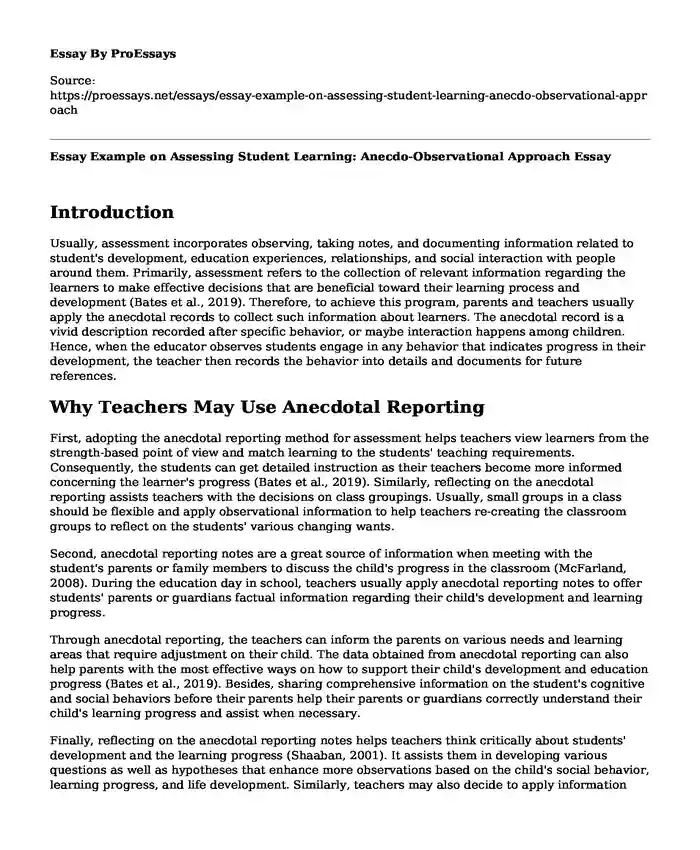Introduction
Usually, assessment incorporates observing, taking notes, and documenting information related to student's development, education experiences, relationships, and social interaction with people around them. Primarily, assessment refers to the collection of relevant information regarding the learners to make effective decisions that are beneficial toward their learning process and development (Bates et al., 2019). Therefore, to achieve this program, parents and teachers usually apply the anecdotal records to collect such information about learners. The anecdotal record is a vivid description recorded after specific behavior, or maybe interaction happens among children. Hence, when the educator observes students engage in any behavior that indicates progress in their development, the teacher then records the behavior into details and documents for future references.
Why Teachers May Use Anecdotal Reporting
First, adopting the anecdotal reporting method for assessment helps teachers view learners from the strength-based point of view and match learning to the students' teaching requirements. Consequently, the students can get detailed instruction as their teachers become more informed concerning the learner's progress (Bates et al., 2019). Similarly, reflecting on the anecdotal reporting assists teachers with the decisions on class groupings. Usually, small groups in a class should be flexible and apply observational information to help teachers re-creating the classroom groups to reflect on the students' various changing wants.
Second, anecdotal reporting notes are a great source of information when meeting with the student's parents or family members to discuss the child's progress in the classroom (McFarland, 2008). During the education day in school, teachers usually apply anecdotal reporting notes to offer students' parents or guardians factual information regarding their child's development and learning progress.
Through anecdotal reporting, the teachers can inform the parents on various needs and learning areas that require adjustment on their child. The data obtained from anecdotal reporting can also help parents with the most effective ways on how to support their child's development and education progress (Bates et al., 2019). Besides, sharing comprehensive information on the student's cognitive and social behaviors before their parents help their parents or guardians correctly understand their child's learning progress and assist when necessary.
Finally, reflecting on the anecdotal reporting notes helps teachers think critically about students' development and the learning progress (Shaaban, 2001). It assists them in developing various questions as well as hypotheses that enhance more observations based on the child's social behavior, learning progress, and life development. Similarly, teachers may also decide to apply information from anecdotal reporting to help informal assessments of the learners, such as growth and learning progress checklists (McFarland, 2008). Again, in case of any academic problem affecting the student like not making progress as expected, the teacher can share child’s anecdotal reporting notes as well as learning reflection with the fellow teachers to develop new ideas regarding lessons and academic activities to help in boosting child’s progress (Shaaban, 2001). With this support, the student feels cared for and willing to work hard to achieve their academic and development goals.
Conclusion
Typically, adopting anecdotal reporting notes by the teachers in their classrooms is the basis for the reflective practices and intentional academic instructions to help children achieve social behavior, academic progress, and development. Anecdotal reporting enables teachers to identify their learners' various needs as far as their learning progress and development are concerned. Parents are also able to use information obtained from the anecdotal reporting to identify any challenge affecting their child's development and improvement and support them where necessary. This reporting approach also enables the child to develop morally and socially in the modern world.
References
Bates, C. C., Schenck, S. M., & Hoover, H. J. (2019). Anecdotal records: Practical strategies for taking important notes. YC Young Children, 74(3), 14-19.
McFarland, L. (2008). Anecdotal records: Valuable tools for assessing young children's development. Dimensions of Early Childhood, 36(1), 31.
Shaaban, K. (2001, April). Assessment of young learners. In the English teaching forum (Vol. 39, No. 4, pp. 16-23).
Cite this page
Essay Example on Assessing Student Learning: Anecdo-Observational Approach. (2023, Sep 19). Retrieved from https://proessays.net/essays/essay-example-on-assessing-student-learning-anecdo-observational-approach
If you are the original author of this essay and no longer wish to have it published on the ProEssays website, please click below to request its removal:
- Teaching Quality and High School Graduation Rates Essay
- Teaching in Different Countries Essay
- Essay Sample on Classroom Activities Before Christmas
- Intelligence Tests in Schools Paper Example
- Essay Sample on Exploring Autism at a Preschool Setting
- Essay Example on the Power of College Traditions: Building Shared Values & Identity
- College Athletes: Pay or Amateur? - Essay Sample







